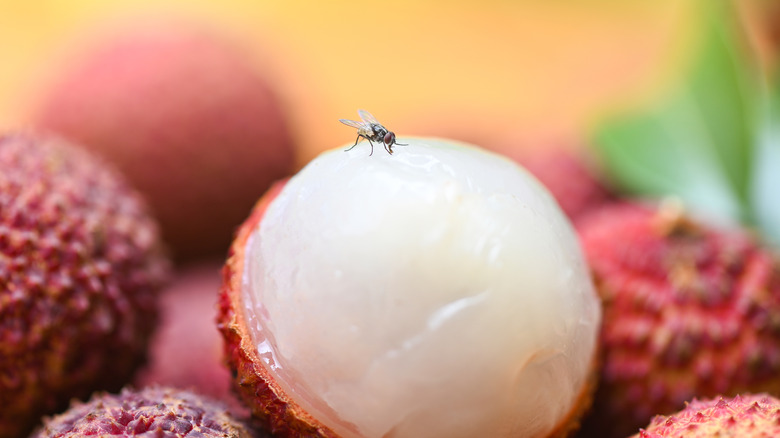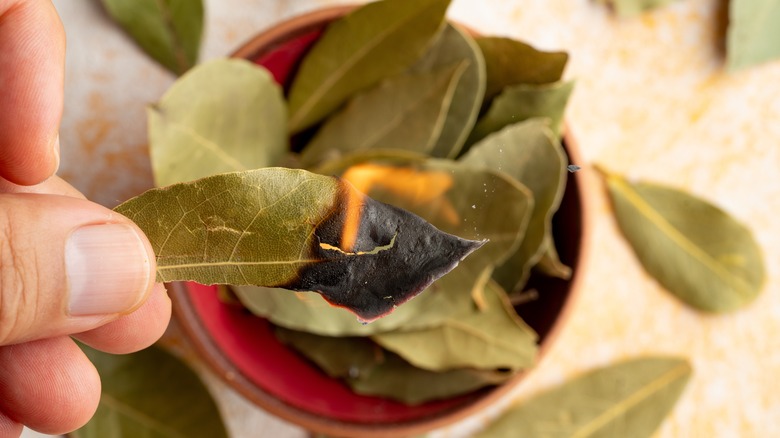Steer Clear Of Kitchen Bugs With A Simple Herb Hack
Kitchen bugs can make their way into your cupboards and food boxes, no matter how often you clean your home. While these pests are not necessarily harmful, they can become a major nuisance. One solution is to use bug repellents, but such products contain dangerous chemicals. Some may cause skin irritation, nausea, high blood pressure, allergic reactions, migraines, and other adverse effects, reports a 2017 review featured in the journal Environmental Toxicology and Pharmacology.
Luckily, it's possible to pest-proof your kitchen without resorting to harsh chemicals. For example, certain plants contain essential oils and other compounds with insect-repelling properties. All you need to do is scatter them throughout your home to keep those pesky bugs away. With that in mind, consider using bay leaves, peppermint oil, or cinnamon rather than bug spray. These natural products won't kill the bugs, but their flavor and scent will keep them from coming back.
Use bay leaves to keep bugs out of your kitchen
Bugs, ants, and other insects are widely consumed in some countries, but this doesn't mean you want them in your kitchen. For starters, spread fresh bay leaves on the floor, especially under the refrigerator and cabinets. You can also put them in your pantry, behind appliances, and inside food bags, as their scent will repel most bugs. If you have pets, place them in areas where they can't reach them. This plant contains eugenol and other compounds that can be toxic to dogs and cats.
If you don't want to scatter bay leaves around the kitchen, boil them for an hour or longer. The smell should be strong enough to deter cockroaches and other pests. Alternatively, put the leaves in a glass bowl or clay pot and burn them to release their scent. Do it every evening until you no longer see those pesky bugs.
For even better results, mix the bay leaves with lavender, peppermint, catnip, or other herbs with insect-repellent properties — and then burn them. As an added benefit, bay leaf burning may also help reduce anxiety and calm your mind. The downside is that it may not be safe for those with asthma, allergies, or diabetes.
These common herbs are natural pest deterrents
From a practical standpoint, it's cheaper and more convenient to use bay leaves than other natural pest deterrents. This plant is widely available and costs as little as $8 per ounce. Another option is to scatter catnip throughout your kitchen. Catnip belongs to the mint family and contains iridoids, nepetalactone, and other compounds that repel insects. The same goes for catnip essential oil, which has proven effective against cockroaches, mosquitoes, and houseflies, according to 2023 research published in the journal Frontiers in Plant Science.
Similarly, oregano essential oil is rich in volatile compounds that repel brown-banded cockroaches and other pests. Cinnamon essential oil should work, too. Cinnamaldehyde, one of its active compounds, is particularly effective against American cockroaches. This chemical can damage their respiratory system and cell membranes, keeping them away from the areas where you apply the oil. Alternatively, use anise star essential oil, which has similar effects.
You can also mix white vinegar and peppermint oil to make a natural bug spray. Apply it to the countertop, table, and other surfaces, as well as underneath furnishings. Or you can soak some cotton balls in peppermint oil and place them around the kitchen to deter unwanted guests.


